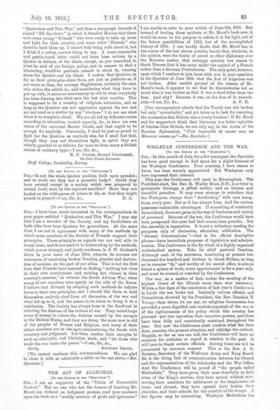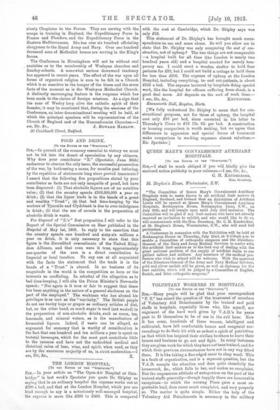WESLEYAN CONFERENCE AND THE WAR. [To TEl EDITOR 01 TH1
" SPERTAT01."] Sin,—In this month of July, for a few years past, the Spectator has been good enough to find space for a slight forecast of the Wesleyan Conference. Your courtesy, I have reason to know, has been warmly appreciated. Not Wesleyans only have expressed their interest.
This year the Conference will meet in Birmingham. The President-elect, the Rev. R. Waddy Moss, D.D., is a tutor in systematic theology, a gifted author, and an intense and beautiful preacher. It may seem strange to outsiders that the Wesleyans change their " Archbishop," with rare excep- tions, every year. But so it has always been. And the custom possesses undeniable advantages. If something of continuity be sacrificed, there are gains in the way of freshness and variety of personnel. Because of the war, the Conference would have been postponed this year had that course been possible. But the assembly is imperative. It is not a voluntary meeting for purposes only of discussion, education, edification. The Several Conversations "—that is the official descriptive phrase—have immediate purposes of legislation and adminis- tration. The Conference is the fly-wheel of a highly organized ecclesiastical system. Take its chief pastoral function. Although each of the ministers, numbering at present two thousand five hundred and thirteen in Great Britain, so long as he remains "fit," and worthy of his sacred office, is always found a sphere of work, every appointment is for a year only, and must be created or renewed by the Conference.
The war, as a matter of fact, makes the meeting of the highest Court of the Church more than ever necessary. Within a few days of the conclusion of last year's Conference in Leeds the war broke out. Instantly various officials and Committees, directed by the President, the Rev. Dinsdale T. Young—than whom, let me say, no religious Communion has provided a more dignified and resolute exponent of the war or of the righteousness of the policy which this country has pursued—put into operation their executive powers, and thou have been fully and consistently sustained throughout the year. But now the Conference must confirm what has been done, examine the present situation, and adjudge the outlook. Happily, so far as one can tell, the Conference will have no occasion for criticism or regret in relation to the past. It will have to thank certain officials. Among these one will be prominent by common consent. This is the Rev. J. H. Bateson, Secretary of the Wesleyan Army and Navy Board. He is the living link of communication between his Church and the representatives of the Admiralty and the War Office. And the Conference will be proud of " the people called Methodists." They have given their sons cheerfully to hol h arms of the King's service; they have spared without mur- muring their ministers for enlistment or for chaplaincies at home and abroad; they have opened their homes, their churches, and their schools for the comfort of the troops. A few figures may be interesting. Wesleyan Methodism has
ninety Chaplains to the Forces. They are serving with the troops in training in England, the Expeditionary Force in France and Flanders, and the Expeditionary Force in the Eastern Mediterranean. She has over six hundred officiating clergymen to the Royal Army and Navy. Over one hundred thousand eons of Methodist homes are serving in the King's forces.
The Conference in Birmingham will not be without real anxieties as to the membership of Wesleyan churches and Sunday-schools. A somewhat serious downward tendency has appeared in recent years. The effect of the war upon all forms of organized religion is sure to be felt in a Church which is so sensitive to the temper of the times and the stern facts of the moment as is the Wesleyan Methodist Church. A distinctly encouraging feature is the response which has been made to the claims of foreign missions. As a sign that the sons of Wesley keep alive the catholic spirit of their founder, it may be mentioned that, during the sessions of the Conference, an inter-denominational meeting will be held, at which the principal speakers will be representatives of the Church of England and of the Nonconformist Churches.—I



































 Previous page
Previous page